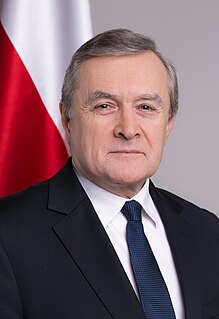
The coat of arms of Poland is a white, crowned eagle with a golden beak and talons, on a red background.

Calea ternifolia is a species of flowering plant in the aster family, Asteraceae. It is native to Mexico and Central America. Its English language common names include bitter-grass, Mexican calea, and dream herb.

A voivodeship sejmik, also known as a provincial or regional assembly, is the regional-level elected legislature for each of the sixteen voivodeships of Poland. Sejmiks are elected to five-year terms, decided during nationwide local elections. The size of the legislative assembly varies for each voivodeship depending on the population; in lower populated provinces, there are 30 members, while in the most populous there are 51 members. Elected representatives of an assembly are known as councillors (radni).

Dziennik Ustaw or Dziennik Ustaw Rzeczypospolitej Polskiej is the most important Polish publication of legal acts. It is the only official source of law for promulgation of Polish laws. The publication of this journal is solely the responsibility of the Prime Minister of the Republic of Poland. 'Dziennik Ustaw' traces its history to the 1918 'Dziennik Praw Królestwa Polskiego' and has changed its name several times during its existence.
Wojciech Paweł Saługa is a Polish economist and politician. He is the current Marshal of Silesia.

MBZP (1-methyl-4-benzylpiperazine) is a stimulant drug which is a derivative of benzylpiperazine. MBZP has been sold as an ingredient in legal recreational drugs known as "Party pills", initially in New Zealand and subsequently in other countries around the world.

God, Honour, Fatherland or Honour and Fatherland is one of the unofficial mottos of Poland. It is commonly seen as the motto of the military of Poland, and has been confirmed as such by several Polish legal decrees. It traces its history to the era of partitions of Poland and Polish service in Napoleonic army.

Flephedrone, also known as 4-fluoromethcathinone (4-FMC), is a stimulant drug of the cathinone chemical class that has been sold online as a designer drug starting in 2008.

The Majdanek State Museum is a memorial museum and education centre founded in the fall of 1944 on the grounds of the Nazi Germany Majdanek death camp located in Lublin, Poland. It was the first museum of its kind in the world, devoted entirely to the memory of atrocities committed in the network of slave-labor camps and subcamps of KL Lublin during World War II. The museum performs several tasks including scholarly research into the Holocaust in Poland. It houses a permanent collection of rare artifacts, archival photographs, and testimony.

Piotr Tadeusz Gliński is a Polish sociologist, professor, university lecturer and politician. He served as President of the Polish Sociological Association from 2005 to 2011. He was the nominee of Law and Justice, the largest opposition party, for Prime Minister of Poland. In the cabinet of Beata Szydło, he serves as the First Deputy Prime Minister and the Minister of Culture and National Heritage in the Law and Justice government.

A three-part referendum was held in Poland on 6 September 2015. Voters were asked whether they approved of introducing single-member constituencies for Sejm elections, maintaining state financing of political parties and introducing a presumption in favour of the taxpayer in disputes over the tax law.

A voivodeship marshal is the head of the provincial-level government for each of the sixteen voivodeships of Poland. Elected by councillors from the provincial assembly, the marshal is the head of the collective voivodeship executive board, which acts as the de facto cabinet for the region. The current competences and traditions of the contemporary voivodeship marshal stem from the Public Administrative Reform Act of 1998, which went into effect in January 1999.

Adam Glapiński is a Polish economist and politician, the current President of the National Bank of Poland, Economics professor, a member of the first term of the Sejm, a member of the fourth term of the Senate and between 2010–16 a member of the Monetary Policy Council. He also served as the Minister for Construction and Spatial Planning and later as the Minister for Foreign Economic Cooperation.

Possession of most drugs for recreational use, including cannabis, is illegal in Poland. It was classified as a narcotic in 1951 but it was not until 1997 that possession and use of the drug became a crime. Since 2011, prosecutors have the discretion to drop the charges if the quantity of drugs seized is only a small amount. The medical use of cannabis was legalized in 2017.

Jan Drohojowski (1901-1979) was a Polish diplomat for the governments of the Second Polish Republic and later, Polish government in exile and the People's Republic of Poland.

Sławomira Wronkowska-Jaśkiewicz, PR is a Polish legal scholar, Professor emeritus of Jurisprudence at the Adam Mickiewicz University in Poznań. She has a particular interest in legal theory, legislation, legal interpretation, legal reasoning and philosophy of law. She belongs to the Poznań school of legal theory.

Joanna Wronecka is a Polish diplomat, since November 2017 serving as a Permanent Representative of Poland to the United Nations.

Borys Piotr Budka – Polish politician, member of Sejm of the 7th, 8th and 9th legislature, Minister of Justice in 2015, vice-president of the Civic Platform political party in the 2016–2020 period, leader of the parliamentary political group of Civic Coalition since 2019, leader of the Civic Platform since 2020.

Mateusz Bochenek is a Polish politician. In 2018 to 2019 he was chairman of the Sosnowiec city council, a member of the Polish parliament of the 9th term.

















